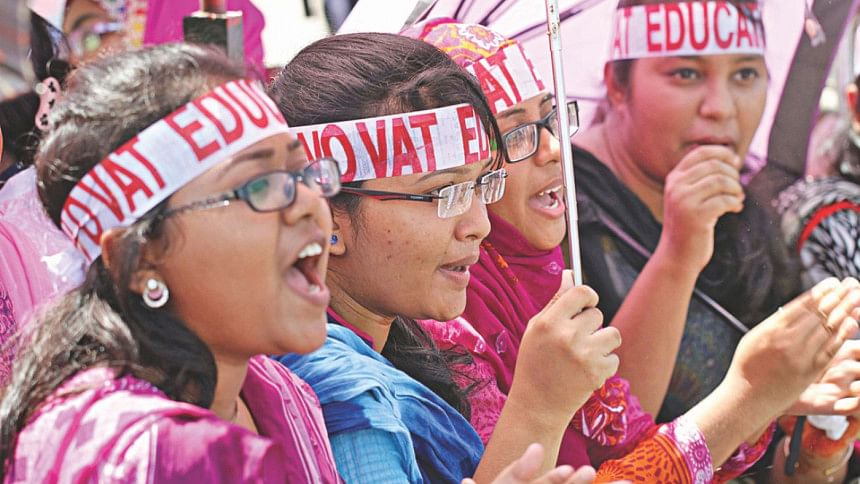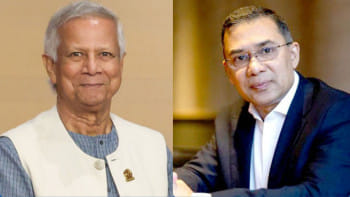The possibility for transversal politics

The students of private universities have shown their maturity and creativity in leading a peaceful demonstration against the proposed 7.5 percent VAT. They managed to show the nation that transversal politics is possible; unity is possible among diversities. They have set an example for politicians, and given hope to the country that they can rise above petty partisan politics and get their demands met by being logical, consistent and coherent. They were not merely a bunch of Facebook addicts; they used the virtual platform efficiently as their training ground, articulating their desire and coordinating with their compatriots. They were not alienated 'farm chickens' anymore; they proved that they are responsible citizens who know how to voice their demands. This will go down in history as a new kind of student movement - a potential game changer.
What outraged private university students was not just the imposition of the VAT itself but the police brutality against the students of East West University. They stood united against injustice, and critiqued governments' policy, not the state. They managed to convince their respective institutions that they are capable of handling their own fate; they were sensible enough to understand that they were shutting down the city and apologised to the citizens, helping them as much as they could. Students knew they had to take to the streets as that is the only language powerful people understand. But they also understood that politicians could hijack their movement, therefore had to be extra cautious in articulating their demands. And thankfully it worked and government was wise enough to lift the VAT from their tuition fees.
I am supposed to be happy with the outcome. Unfortunately, I cannot get over the discourses dominating the media over the past few days. During the beginning days of the movement, the media was hesitant to cover it with adequate focus on the demands; a lot of attention was given on the crazy traffic situation on the first day of the protest and many Facebook users also termed these students as "miscreants." In fact, one of my colleagues also commented that students of East West were vandalising public property, forcing the police to use rubber bullets. As if that was the right thing to do – to use brutal force to teach a lesson. Some intellectuals also debated over how private university students were advancing the neoliberal script by "buying certificates and reducing education to a commodity." Some firmly asserted that a hike in tuition fees is nothing for these "rich kids". Clearly, they are not aware of the demographic distribution of private university students.
We could hardly hear anyone asking why the NRB had to intervene when we have a Ministry of Education. Why is there no coordination between the said ministries? Why were these private universities not consulted before the decision to impose VAT was taken? The staff of private universities and the institutions themselves are paying their taxes, then why burden students with extra VAT?
I am not saying private universities are not making money. Of course, they are. The difference is some are reinvesting a portion of their profits to enhance infrastructural facilities in student and faculty development which is not subsidised by the government. The fact remains that 60 percent of the students (about 1,20,200 to 1,50,000 students) at tertiary level in the country are receiving education in private universities. They are studying in these institutions not necessarily because they want to, but because they had no other choice. Public universities can't offer enough seats for every student of Bangladesh. If they could access affordable public university education, they wouldn't pay for such expensive degrees. It is simple math.
Public university education is subsidised to accelerate the number of qualified professionals to run state machineries. And we often forget that it is subsidised with public tax. While spectators were busy generalising the quality of education in private universities, they remained silent about the corruption and political appointments of teachers in public universities. It is unfortunate that our intellectuals seemed to have lost their moral high ground and the opportunity of critical engagement on the issue of broad based education. We have a University Grants Commission to regulate both public and private universities. It is high time they start standardising the curricula both in public and private universities. I know for the fact that World Bank has funded projects which are supposed to assure the quality of universities. I sincerely hope that UGC will continue the work even when the funds dry up. I would also like to propose a fair evaluation of both public and private universities and make the grants available according to their performances.
We don't dare ask for subsidies but demand minimum recognition that we are no lesser than any public university in terms of training future citizens. Some of us have left well-paid jobs in foreign terrains and returned to our country to give back. Some of us were trained in private universities and attained our MS and PhDs from respected universities abroad. Some private universities and faculties are investing their resources in building a space for critical engagement.
This movement, like any other movement, did not happen overnight. I want the state and its intellectual commune to recognise that they are alienating private universities and their students with their discriminatory attitude. These students are able-bodied citizens who are about to join the workforce; so it's imperative that they are not reduced to mere consumers.
My colleagues and I stood by our students as we know their stories and we know what they are fighting for. In my teaching career, I have taught hundreds of students and got the chance to know them better. A huge chunk of my students at BRAC University hail from cities or villages outside Dhaka and less than 5 percent are from elite or upper-middle class households. When I spoke to some of the parents, I understood that they had to keep account of every penny they spend on their children's education. I have met students who study on scholarships or some sort of financial assistance semester after semester; students deferring their education as they couldn't manage their tuition fees. I know a single mother who is struggling to finish her education by tutoring four students, raising her children all alone as her husband is working in another town. When I saw all these faces in the demonstrations against VAT, I could smell the change in air. VAT or no VAT, they have finally learned to claim what is rightfully theirs. Victory is theirs!
The writer is Assistant Professor, Anthropology Program, Dept. of Economics and Social Science, BRAC University.

 For all latest news, follow The Daily Star's Google News channel.
For all latest news, follow The Daily Star's Google News channel. 



Comments